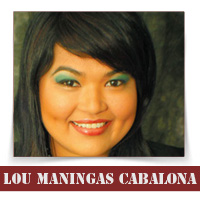
By: Lou Maningas Cabalona
Learning that the FANHS biennial conference was scheduled for this summer in Chicago, I was excited! We were slated to be one of the main performers of the Welcome Reception at the beginning of the 4-day event on July 11 and I was excited at the prospect of our band, Sama- Sama Project performing to Filipino American audiences across the USA.
While I heard this was one of the biggest and most prestigious gathering for the Filipino American community, attending a “historical society” conference did not appeal to me. I imagined it would be a meeting of historians and academics discussing white papers and, frankly, I imagined, a lot of older people. It also did not help that most of the activities were scheduled during the work week.
But closer to the event, I found myself committing to attend the conference to support FYLPRO, the organization of Fil Am leaders across the USA I belong to, after I worked with Almira Gilles, one of the conference organizers, to get a 40 minute Friday slot for our group to talk about the upcoming annual immersion program we host with Ayala Foundation and the Department of Foreign Affairs.
I had a mission to help spread the word about our advocacy in FYLPRO but I what I took away from it was so much more.
Taking a long lunch break from work to attend, I only had a chance to listen to one other presentation.
I am thankful I sat in one entitled “Pinays In the Kitchen” where University of San Francisco professor of History, Dr. Dawn Mabalon and fellow FYLPRO alumni, Joanne Boston of JBKollaborations, presented how Filipinas shaped the lives of their families and their community through food — during the time of farm workers strikes and intense discrimination against Filipinos in the 1930s and 40s until now when Filipino food is finally getting a share of the limelight in the US culinary scene.
I was moved to see pictures of journal entries of Filipina mothers who became breadwinners cooking and selling food when their husbands, mostly farmers, went on strike to protest unjust labor conditions and demand better wages. Even with the disparity often portrayed in text between Filipino laborers led by Larry Itliong and Mexican farmers led by Cesar Chavez, it was refreshing to see another side of the labor movement where Filipina and Mexican women were side by side in the meeting hall kitchens providing meals for the strikers of any race.
I heard Dr. Mabalon speak for not more than 15 minutes but that was enough for me to want to read about her life and works. A third generation Pinay born in Stockton from a family of farm workers, she considered pursuing journalism until a close friend, Dillon Delvo, chided her about not writing stories about her people. She took this to heart and began her path as a historian promoting and writing passionately about the contributions of Filipino Americans in the American labor movement. Eventually, she became one of the leaders, along with Delvo, in the preservation of the Little Manila Historical District in Stockton, a town that was home to the largest Filipino community in the US in the 40s.
To me, she was a jewel in the Filipino American community and her untimely death on August 10 while on a family vacation in Hawaii is a big loss to our community.
“So many people have found so much inspiration, so much identity through her work,” Delvo told Inquirer.net, who added that young Filipino Americans, especially women, were inspired to go to college and study their history because of Mabalon. “Her work empowered so many thousands of us. Her loss leaves such a gaping hole for all Filipino Americans right now.”
I am hopeful though that where she left off, many will carry on in the field of history and otherwise.
And that, was evident in the variety of speakers during the conference – visual artists, directors, writers, musicians, nurses, social workers and veterans who aimed to share what they have learned or personally experienced about an aspect of our history as Filipinx in the USA.
Daniel Moen, a Graphics Designer from Michigan, in his presentation called #FilAmpon, shared his own adoption story to American parents and his journey reuniting with his biological family in the Philippines in 2017. He also utilized this platform to discuss the issues all adoptees face in today’s political climate with the threat of deportation and what resources are out there for other adoptees searching for their roots.
“I believe that many Filipino Americans, especially the younger generation, may feel marginalized. Our history is hardly – if ever – discussed in schools and without knowing our history, we slowly erase many people from our social memory”, shares Daniel. “The conferences … help us understand who we are as Filipino Americans”.
And I would add, the many facets of our identity as people as reflected in the titles of other breakout sessions I wish I could have attended. “Filipinos in Louisiana”, “Sakadas and Soldiers: Hawaii Filipinos in WWI”, “The Ups and Downs of a Filipino chauffeur Working for Hollywood Movie Stars During the Golden Age of Hollywood”, “Albany Park: Ellis Island of Chicago 1985-1995”, “Filipina-American Marriages in Philippine-American War”, just to mention a few.
“I’ve been attending the FANHS biennial conferences since I was a college student” says Kevin Nadal, a Professor of Psychology and a longtime proponent of the Brown Asian Movement. “It’s the one place where I can be in a room with Filipino Americans from across the US, discuss the experiences of our ancestors, share our own stories, and truly feel understood, appreciated, and celebrated.”
Attending the FANHS conference, albeit only for a short while, I have learned that ALL kinds of people from different age, background and careers are passionate about and making strides in making a piece of the Filipino story –from across different lands and through the decades and centuries of our migration in America – known. Because, as a Filipino American, every one of us can and should not only be a custodian of our own history, but authors of our own people’s story.
Chicago Philippine Consulate General hosts FYLPRO Immersion Program Info Session
The Philippine Embassy to the United States, the Philippine Consulate General in Chicago, Ayala Foundation, and the Filipino Young Leaders Program (FYLPRO) welcomed interested applicants and the general public to the FYLPRO Chicago Info Session last Thursday, August 16 at the Kalayaan Hall of the Chicago Philippine Consulate General at 122 S Michigan Avenue, Chicago IL from 5:30 p.m. – 7:30 p.m.
During the session, members of the Chicago alumni composed of Louella Cabalona (2012), Jan Paul Ferrer and Abbey Eusebio (2014), Lakhi Siap (2015) and Marjorie Baltazar (2017) spoke about the prestigious program founded by Ambassador Jose Cuisia Jr in 2012, its mission and robust network, and the much-anticipated immersion trip in November. Interested applicants for this year’s immersion trip can check www.fylpro.org or email mabuhay@fylpro.com for more details. Deadline for application is September 1, 2018.
FMOC Summer Music Workshop culminates with a Recital
Congratulations to the students of the 1st Summer Music Workshop organized by the 501(c)3 not-for-profit, the Filipino Musicians of Chicago, Inc which culminated in a recital performance at the Seafood City Chicago last August 19 at 430 p.m. Workshop graduates Claire Abroguena, Earl Henry Lim IV and Faith Lim for Voice, Edwin J. Arana, Nathan M. Arceo for Drums, Jaedon M Arceo for bass guitar and Orlando “Benjamin” Bernardo for guitar received their Certificates of Completion from FMOC President Rudy Campos and their respective instructors after the 3 week session that focused on learning how to play instruments and working together as a band. Proceeds of the workshop will go towards the projects of FMOC that help ailing musicians and bereaved families of members who passed.
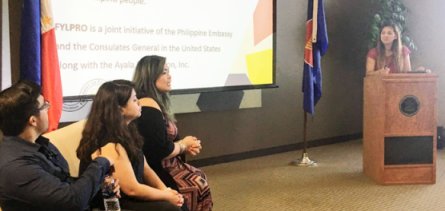
FYLPRO Chicago Alumni talking about the immersion program at the Chicago Philippine Consulate General – (from L to R) Lakhi Siap, Abbey Eusebio, Louella Cabalona and Marjorie Baltazar
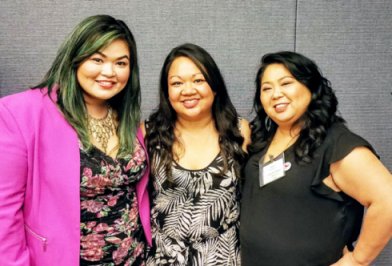
With presenters of FANHS conference session entitled “Pinays In the Kitchen” – Joanne Boston of the Filipino Food Movement and Dawn Bohulano Mabalon, a professor of History at the San Fransisco State University who spoke about the Filipino American women of Stockton who influenced history through their cooking
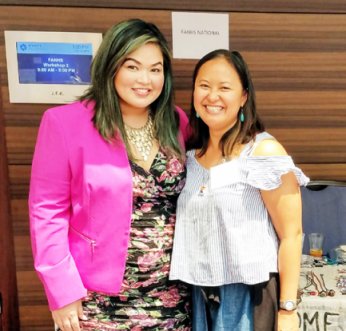
With Emmy award winning director, Marissa Aroy who facilitated a workshop entitled “Making Your Own Documentary”. Aroy produced and directed the documentary The Delano Manongs: Forgotten Heroes of the United Farm Workers
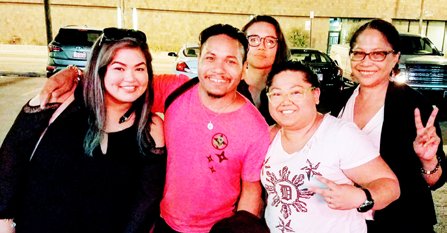
With graphic artist Dan Moen, Tagalog language teacher at Philippine American Community Center of Michigan Nanette Maranan Green and two other delegates from Detroit
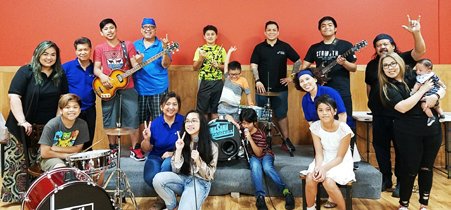
FMOC Students and Instructors posing for a shot on workshop day 2

FYLPRO Alumni from around the USA with some of the attendees of their breakout session at the FANHS conference – (standing fr L to R) Joanne Boston, Jason Tengco, Abbey Eusebio, Jan Paul Ferrer, Louella Cabalona, Donny Rojo and (far right) Anthony Guevarra.
 VIA Times – August 2018 Issue Vital News, Vibrant VIews for Asian Americans in Chicago & Midwest
VIA Times – August 2018 Issue Vital News, Vibrant VIews for Asian Americans in Chicago & Midwest

